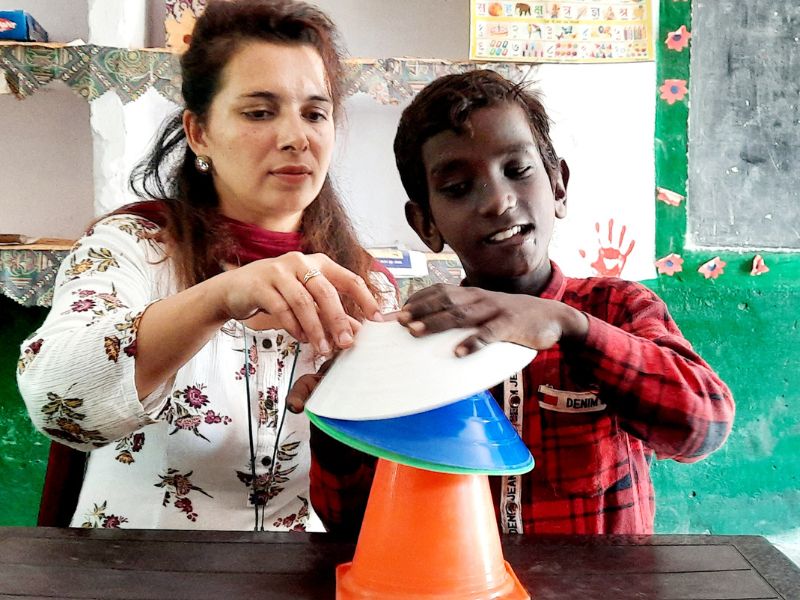-Nishant Saxena
Meet Deepmala Pandey, 40, a government school Principal from Bareilly. Her claim to fame is the fact that she has been instrumental in getting over 800 specially-abled children enrolled in regular schools. Supported by close to 450 teachers spread across the state, this mother of a ten-year-old boy, has been championing the cause of inclusive education for the past five years. There is something special about her! So special that the Prime Minister took note of her and heaped praises on her in Mann ki Baat, his radio show.
“It all started with Anmol, a special child whom I enrolled in my school five years ago. He suffers from Amnesia and is mute. Naturally, he had severe limitations with learning. But after engaging with him for a while, feeling his affection for myself, and the kind of improvement he started showing, I felt determined to do something for other such children,” tells Deepmala.
Anmol is now 11 and studies in class five in Deepmala’s school, which currently has three other children with physical or intellectual limitations, other than the over 200 regular children. Anmol’s mother, Munni Devi, is overwhelmed with emotions at the mention of what role the school and Deepmala have played for her son. “He has improved beyond my expectations. He is relatively more self-reliant and is quite confident,” she tells.
Deepmala gleefully adds, “Anmol also gets a government scholarship. I remember the day when the form for this scholarship was to be signed. Usually, parents of such children sign on behalf of their wards. But in this case, Anmol signed it himself. It was such a heartening sight that I feel a loss of words to express the emotions.” She further shares her happiness telling how Anmol has improved over the years and now manages to use a phone and is even able to communicate despite being mute.
The bright teacher, soon after engaging with Anmol, decided to scale up the initiative and do something more and beyond what she had been doing with Anmol. So, she started traveling to neighboring villages and started meeting parents of special children, and began urging them to send their children to school. “Initially the parents used to be reluctant. It seemed they had given up on their special child and found it inconsequential to send them to school. They even feared other children harassing their children, but eventually, I managed to convince them,” tells a confident Deepmala.
She did feel happy about being able to have a few children enrolled in her school, but she soon realized that she cannot do it all alone. “I then created a WhatsApp group in which I added a few fellow teachers. There, I started sharing regular updates about my cause and the role and relevance of inclusive education. It soon struck a chord with other teachers,” tells a beaming Deepmala, who currently has a network of over 450 like-minded teachers, spread in several other districts in the State, working towards enrolling special children in schools in order to mainstream them. “We have together managed to enroll around 800 such children as part of my One Teacher One Call initiative,” reveals Pandey.
The level of her commitment to the cause can be gauged from the fact that even the Prime Minister’s office noticed it and she was mentioned in Mann Ki Baat, the PM’s radio broadcast.
Sharing the significance of inclusive learning, she avers, “It is instrumental in changing discriminatory attitudes. Every child is unique in his or her own way and all should hence be treated equally. This is not only good for special children, but it is also important for other children as well. They get to inculcate persistence, resistance, and sympathy for their companions and friends. They learn cooperation and are able to work in diverse teams.”
Ask her if she needs any kind of support from the authorities, and she says, “The government should do something to increase the number of special educators because there’s an immense need to have more people who are skilled in engaging with children with special needs. Then, it would be nice if the government supports organizing sensitization workshops for parents and teachers. It would eventually lead to more special children getting to attend schools.”
Well, we wish her luck and more power!
The Empowerment of Persons with Disabilities Department, UP, the website states, “According to Indian Census, the year 2011, In Uttar Pradesh the total number of Person with various disabilities is 4157514. This figure is approximately 2.08 percent of the total population of the state. These include persons with Visual, Hearing, Speech, Movement, Mental Retardation, Mental Illness, Multiple Disability, and other disabilities.”
The 2011 census also reveals that three states—Uttar Pradesh, and Bihar—together constitute 50% of differently abled children (0-6 years) of the country, and 29% of these children reportedly do not have access to schools.
